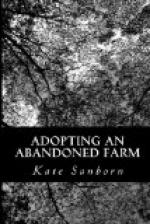A farm-house looks on the outside like a quiet place. No men are seen about, front windows are closely shaded, front door locked. Go round to the back door; nobody seems to be at home. If by chance you do find, after long bruising of knuckles, that you have roused an inmate, it is some withered, sad-faced old dame, who is indifferent and hopelessly deaf, or a bare-footed, stupid urchin, who stares as if you had dropped from another planet, and a cool “Dunno” is the sole response to all inquiries.
All seems at a dead standstill. In reality everything and everybody is going at full speed, transpiring and perspiring to such a degree that, like a swiftly whirling top, it does not appear to move.
Friends think of me as not living, but simply existing, and marvel that I can endure such monotony. On the contrary, I live in a constant state of excitement, hurry, and necessity for immediate action.
The cows were continually getting out of pasture and into the corn; the pigs, like the chickens, evinced decided preference for the garden. The horse would break his halter and dart down the street, or, if in pasture, would leap the barbed-wire fence, at the risk of laming his legs for life, and dash into a neighbor’s yard where children and babies were sunning on the grass.
Rival butchers and bakers would drive up simultaneously from different directions and plead for patronage and instant attention.
The vegetables must be gathered and carried to market; every animal was ravenously hungry at all hours, and didn’t hesitate to speak of it. The magnificent peacock would wander off two miles, choosing the railroad track for his rambles, and loved to light on Si Evans’s barn; then a boy must be detailed to recover the prize bird, said boy depending on a reward. His modest-hued consort would seek the deep hedges back of a distant swamp.
Friends would come from a distance to surprise and cheer me in my lonely retreat just at the time that the butter must positively be made, while the flowers were choking for water, smothered with weeds, “pus’ley,” of course, pre-eminent. Then a book agent would appear, blind, but doubly persistent, with a five-dollar illustrated volume recounting minutely the Johnstown horror. And one of my dogs would be apt at this crisis to pursue and slay a chicken or poison himself with fly-paper. Every laboring man for miles around would come with an air of great importance to confidentially warn me against every other man that could be employed, with the stereotyped phrase in closing: “Well, whatever you do” (as if I might be left to do anything) “don’t hire John Smallpate or Bill Storer. I’ve known him, man and boy, for thirty years; you’ll do well not to trust him!”
Yet these same men who had so villified each other could be seen nightly lounging in front of the grocery, discussing politics and spitting in sweet unison.
The general animosity of my entire family to each other caused constant interruptions.




